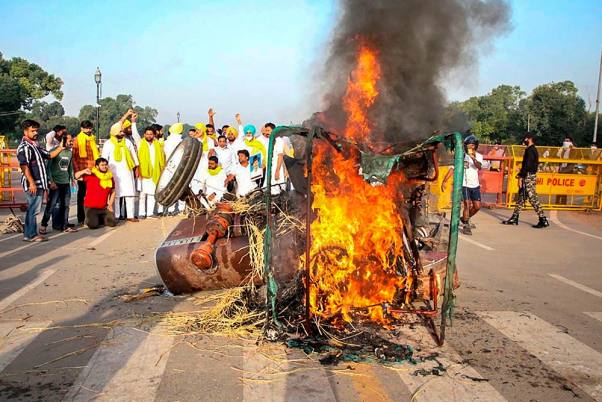It would now appear that the entire nation has, or would soon, erupt into massive farmer protests over the new agriculture legislation that the Union government has brought about in the brief Monsoon Session of Parliament. What started as protests in Punjab and Haryana a week ago has snowballed into resistance in Maharashtra, Madhya Pradesh, Karnataka and many more states, and this also raises a question mark on the prospects of the BJP and the JD(U) alliance’s attempt to retain power in Bihar. Farmers there too are apprehensive about the new law, and their mood can alter the power equations in the state.
Despite criticism about the way the Bills were rushed through in Parliament, breaking conventions and passing them by voice vote, President Ram Nath Kovind has given his assent to the Bills with amazing alacrity, making them into a new law. On the other hand, a Congress MP has approached the Supreme Court, picking holes in the way the Bills were cleared by Parliament, mainly the Rajya Sabha in a huff.
Fears on the part of protesting farmers are, among other aspects, that the Bill will allow corporates to take control over their farms. It was easier for them to handle the middlemen and money lenders in the existing scenario, unlike the corporates that will have much larger resources to drag matters into disputes, fight the cases and get judgments in their favour. To this extent, farmers see the corporates as bigger evils, even though, perfunctorily, the new law promises to eliminate the evil of middlemen in the sale of farm crops – they standing between the consumer and the producer, and extracting the maximum from both the sides. The corporates will simply replace the independent individual middle man.
The corporates are unpredictable too. They operate at a much wider level, and the farmers, unless they stand united, cannot challenge these city-based wolves approaching them in the garb of sheep. There are also serious apprehensions over the status of the MSP in government-led procurement via FCI, as to what form it would take in the new arrangement. The Opposition parties say this could be disbanded altogether and that the eagle-eyed corporates would take full advantage and put farmers at their mercy. There is no clarity about the APMC, the mandi-based arrangements which oversaw the sale of farm produces. Large segments of the farmers are outside what is touted as a reform. Overall, farmers are caught in a quandary, and the protests are adding to their fears of a gathering gloom in the agriculture sector as a whole in the near future.
While Karnataka observed a state-wide bandh, protest was manifest in the burning of a tractor in a symbolic action by pro-farmer youths at India Gate in New Delhi. Highways have been blocked for traffic in the Haryana-Punjab belt, and the political fallout saw the Shiromani Akali Dal quitting the BJP-led NDA, after its representative quit the Union Cabinet a week ago. Initially, SAD was in a mood to remain with the NDA even as it exited the government to soothe the hurt feelings of the farmers. But, the intensity of anger among the agricultural community forced the party to quit the ruling alliance altogether and chart a new course.
There obviously was an attempt at secrecy about the farm Bills and this is also adding to the worries of the farmers and taking them to the streets. If there were sufficient discussions before the reforms were brought about, even in these Covid times, that would have cleared much of the air and a consensus could have been attempted at, if not evolved. As the reform attempt was rushed through, it has created bitterness.
The implications of this protest are serious. Farmers out in the streets cannot be expected to work in their fields and grow crops. Such a protest, if it gets prolonged, could impact food production. If not immediately, it may have repercussions a little while later, just as Demonetization is being acutely felt now, after nearly four summers. The government bargained for such a situation. Transparency is central to the functioning of a government; but there is a serious deficit of this now.
